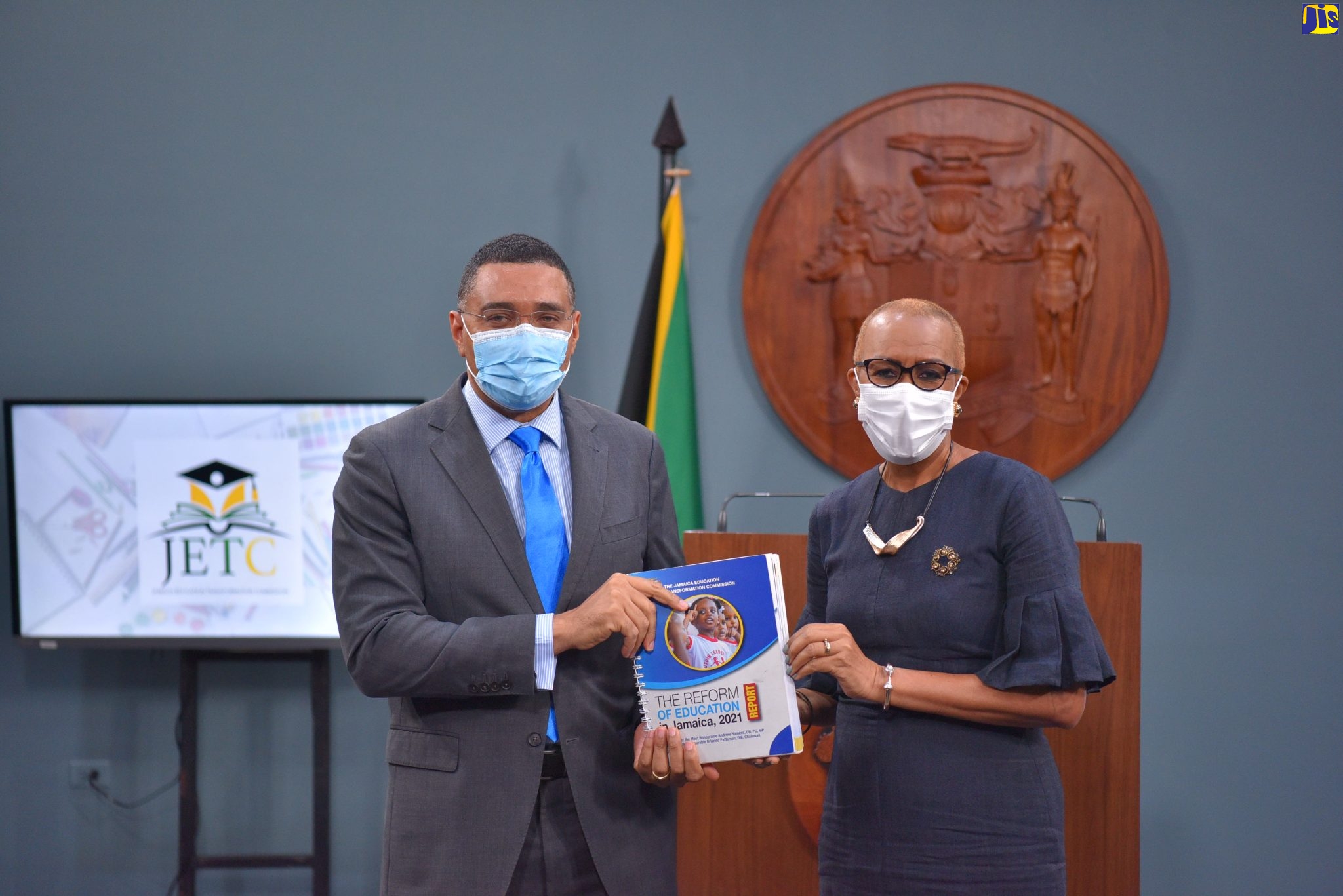Report To Reform Education System Launched
By: , January 14, 2022The Full Story
The Government is taking decisive steps in the transformation of the education system through the launch of the ‘The Reform of Education in Jamaica 2021 Report’, on Thursday (January 14).
Developed by the Jamaica Education Transformation Commission (JETC), the Report is a blueprint for the establishment of a comprehensive strategy to improve student performance and educational productivity across the sector.
The 342-page document has 54 prioritised recommendations. Key recommendations include governance and accountability; early-childhood education; teaching curriculum, and teacher training; tertiary education; technical and vocational education and training (TVET); infrastructure and technology; and finance.
The public release of the Report will be available on the website of the Office of the Prime Minister and other platforms for increased accessibility. An abridged version of the document will also be made available.
In his address at the virtual launch, Prime Minister, the Most Hon. Andrew Holness, said the COVID-19 pandemic has greatly exacerbated and deepened the pre-existing inequalities in the sector.
“Thousands of our children, particularly those from the poorest households, have had limited or no access to the education that they really need for almost two years, resulting in massive learning loss and dropout rates,” he informed.
Outlining the way forward, Prime Minister Holness said the Ministry of Education and Youth is to develop a detailed plan for implementation of the recommendations with timelines.
“The Ministry has to be responsible for the implementation. As far as possible, we must use the existing resources within the Ministry, and where there are capacity gaps we must build the capacity to address those gaps. In order to be sustainable, the reforms cannot be undertaken from outside the Ministry. This will not build capacity within the Ministry to sustain the reforms,” the Prime Minister explained.
To ensure that the recommendations are implemented, Mr. Holness announced that by the end of January 2022, a monitoring and oversight committee drawn from members of the Commission and key stakeholders will be appointed.
“This committee will be responsible for monitoring and publicly reporting on the progress of implementation of the recommendations. We are serious about this transformation. We must take decisive steps to improve access to quality education for the poor and underprivileged,” he emphasised.
For her part, Minister of Education and Youth, Hon. Fayval Williams, said prior to this most recent Report, there have been several others – the 2004 Taskforce on Educational Reform, the Education System Transformation Programme, which was started in 2010, and the 2012 National Education Strategic Plan.
She said the 2021 Report takes a serious holistic approach to education reform and emphasised the importance of timely implementation of the recommendations.
“Together with the senior policymaking group at the Ministry of Education and Youth, we will map out a work plan complete with timelines and accountability for the recommendations in this report,” the Minister said.
“It is an excellent Report, and if we faithfully and diligently implement the many recommendations, they will begin to show dramatic (short-term and long-term) results,” she added.
Chair of the Commission, Professor the Hon. Orlando Patterson, who gave an overview of the Report, said there is a serious learning crisis in Jamaica.
This, he said, is reflected in data from the 2019 Primary Exit Profile (PEP) examination results which indicate that “a majority of students at the end of primary-school education remain illiterate and innumerate and most are leaving secondary school with no marketable skills”.
Professor Patterson said the 2019 PEP results show that almost 60 per cent of students were failing mathematics, that 33 per cent could not read, that 56 per cent could not write, and 60 per cent exhibited difficulty in comprehension.
Notably, he said the report found that boys are underperforming in several subject areas.
“In mathematics, well over 60 per cent are failing. The same goes for science and language arts, less so in social studies, compared with girls who are doing much better,” he informed.
Professor Patterson said a principal goal of the recommendations set out in the Report is to facilitate equity in education and to place greater importance and channel resources to early-childhood education.
“Early-childhood education is fundamental. One of the major recommendations of our Commission, which is supported by all the subcommittees, is that we have to reprioritise early education. This is the foundation on which education exists. Work done not only by economists in education and sociologists, indicate the importance of early education on later education but also for later social behaviour,” he noted.
The Commission was appointed by Prime Minister Holness and approved by the Cabinet.
It was established to comprehensively review and assess Jamaica’s education system, including its structure, operation and processes and to recommend an action plan for further transformation of the system.



